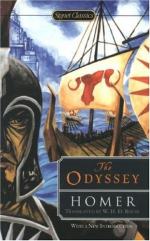And now Eumaeus, at the evening hour,
Came late, returning to his sylvan bower.
Ulysses and his son had dress’d with art
A yearling boar, and gave the gods their part.
Holy repast! That instant from the skies
The martial goddess to Ulysses flies:
She waves her golden wand, and reassumes
From every feature every grace that blooms;
At once his vestures change; at once she sheds
Age o’er his limbs, that tremble as he treads:
Lest to the queen the swain with transport fly,
Unable to contain the unruly joy;
When near he drew, the prince breaks forth: “Proclaim
What tidings, friend? what speaks the voice of fame?
Say, if the suitors measure back the main,
Or still in ambush thirst for blood in vain?”
“Whether (he cries) they measure back the flood,
Or still in ambush thirst in vain for blood,
Escaped my care: where lawless suitors sway,
Thy mandate borne my soul disdain’d to stay.
But from the Hermaean height I cast a view,
Where to the port a bark high-bounding flew;
Her freight a shining band: with martial air
Each poised his shield, and each advanced his spear;
And, if aright these searching eyes survey,
The eluded suitors stem the watery way.”
The prince, well pleased to disappoint their wiles,
Steals on his sire a glance, and secret smiles.
And now, a short repast prepared, they fed
Till the keen rage of craving hunger fled:
Then to repose withdrawn, apart they lay,
And in soft sleep forgot the cares of day.
BOOK XVII.
Argument.
Telemachus returning to the city, relates to Penelope the sum of his travels. Ulysses is conducted by Eumaeus to the palace, where his old dog Argus acknowledges his master, after an absence of twenty years, and dies with joy. Eumaeus returns into the country, and Ulysses remains among the suitors, whose behaviour is described.
Soon as Aurora, daughter of the dawn,
Sprinkled with roseate light the dewy lawn,
In haste the prince arose, prepared to part;
His hand impatient grasps the pointed dart;
Fair on his feet the polish’d sandals shine,
And thus he greets the master of the swine:
“My friend, adieu! let this short stay suffice;
I haste to meet my mother’s longing eyes,
And end her tears, her sorrows and her sighs.
But thou, attentive, what we order heed:
This hapless stranger to the city lead:
By public bounty let him there be fed,
And bless the hand that stretches forth the bread.
To wipe the tears from all afflicted eyes,
My will may covet, but my power denies.
If this raise anger in the stranger’s thought,
The pain of anger punishes the fault:
The very truth I undisguised declare;
For what so easy as to be sincere?”




